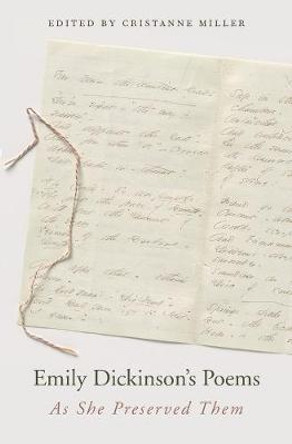Description
Emily Dickinson's fascicles, the forty booklets comprising more than 800 of her poems that she gathered and bound together with string, had long been cast into disarray until R. W. Franklin restored them to their original state, then made them available to readers in his 1981 Manuscript Books of Emily Dickinson. Many Dickinson readers believe their ordering to be random, while others have proposed that one or more of the fascicles appear to center upon some organizing principle.
In this important critical study, Dorothy Huff Oberhaus demonstrates for the first time the structural principles underlying Emily Dickinson's assembling of the fascicles. Oberhaus argues that Dickinson's fortieth fascicle is a three-part meditation and the triumphant conclusion of a long lyric cycle, the account of a spiritual and poetic pilgrimage that begins with the first fascicle's first poem. The author in turn finds that the other thirty-eight fascicles are meditative gatherings of interwoven poems centering upon common themes.
Discovering the structural principles underlying Dickinson's arrangement of the fascicles presents a very different poet from the one portrayed by previous critics. This careful reading of the fascicles reveals that Dickinson was capable of arranging a long, sustained major work with the most subtle and complex organization. Oberhaus also finds Dickinson to be a Christian poet for whom the Bible was not merely a source of imagery, as has long been thought; rather, the Bible is essential to Dickinson's structure and meaning and therefore an essential source for understanding her poems.
Discovering the structural principles underlying Dickinson's arrangement of the fascicles presents a very different poet from the one portrayed by previous critics. This careful reading of the fascicles reveals that Dickinson was capable of arranging a long, sustained major work with the most subtle and complex organization. Oberhaus also finds Dickinson to be a Christian poet for whom the Bible was not merely a source of imagery, as has long been thought; rather, the Bible is essential to Dickinson's structure and meaning and therefore an essential source for understanding her poems.
About the Author
Dorothy Huff Oberhaus is Professor of English, Mercy College, Dobbs Ferry, New York. Her articles on Emily Dickinson have appeared in The Emily Dickinson Journal, The Explicator, ESQ, American Literature, and other journals and anthologies.
Reviews
"What Oberhaus has achieved will force a rereading not only of the fascicles but of the entire canon of Emily Dickinson's poetry. . . . Seldom has a scholar come to such a project so well equipped theologically and with such wide and precise knowledge of the Bible. Oberhaus's reading of the poems is sensitive and sure. She did not come to the task with preconceived notions. What she found was there all the time, waiting for the right reader. And what she found is central."
-Richard B. Sewall
"Oberhaus's purpose is to reveal Emily Dickinson's intended and achieved structure in these forty sequential booklets and to demonstrate that the final fascicle is the account of an Ignatian meditation, a detailed narrative of individual mystical Christian conversion and experience. . . . This is a major, iconoclastic work; it can be expected to provoke lively reactions from leading Dickinson scholars, all of whom have denied that Dickinson ever attempted or achieved a structured interrelationship among her lyrics and that she ever professed sustained religious conviction."
-Jack L. Capps
"In Emily Dickinson's Fascicles: Method & Meaning, Dorothy Oberhaus pays Dickinson an even higher compliment-she shows the scriptural power of the poems in the fortieth fascicle. According to Arthur Henry King, the greatest works of literature are those that came closest to approximating the power of language and truth in the scriptures. Oberhaus helps us experience power in the language and truth of this great American poet."
-Cynthia L Hallen Literature and Belief
Book Information
ISBN 9780271025636
Author Dorothy Oberhaus
Format Paperback
Page Count 276
Imprint Pennsylvania State University Press
Publisher Pennsylvania State University Press
Weight(grams) 454g
Dimensions(mm) 229mm * 152mm * 22mm


